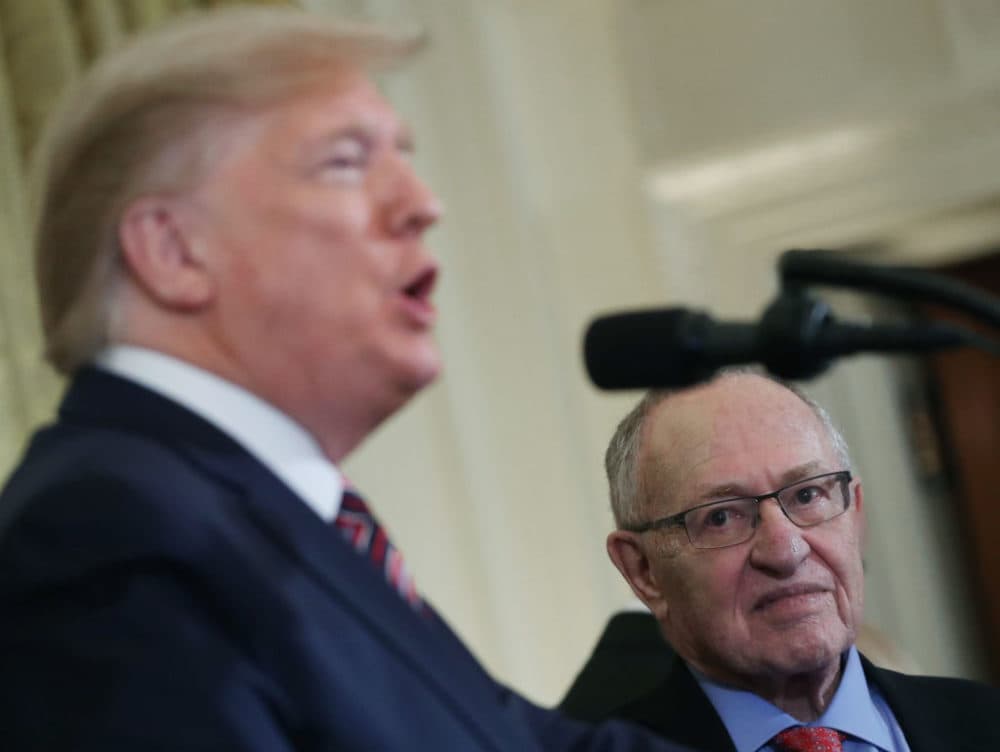Advertisement
Here's What Alan Dershowitz Has Planned For Trump's Impeachment Trial

President Trump revealed the attorneys who will present his case during the the Senate impeachment trial. That list includes Harvard Law School's Alan Dershowitz.
Dershowitz told Radio Boston he will present oral arguments next Friday. He said his role is to focus on constitutional arguments against the impeachment and removal of Trump.
Dershowitz also spoke briefly about his role representing accused child-sex trafficker Jeffrey Epstein. He has also faced accusations of abuse that he has denied.
Interview Highlights:
On his role in the impeachment trial:
"I'm the special constitutional advocate against impeachment — on the articles of impeachment that have been forwarded to the Senate. I'm not really a full-fledged member of the defense team. I won't be strategizing with them about witnesses or about facts. My role is limited to presenting the constitutional argument against impeachment, an argument I've made in two books and 25 articles...
"The plan is for me to ... present the broad constitutional argument, the history of impeachment clause, the reason why the framers did not include abuse of power as a criteria for impeachment, that kind of thing"
On how he feels about Ken Starr, whose investigation led to the impeachment of President Clinton, also joining the defense team:
"I just found out about Ken Starr literally [Thursday] night. So I had no coordination with him...
"In fact, just the day before I learned that [Starr] was on the team, I debated him in Dallas, Texas, about constitutional construction. But, you know, lawyers disagree about things and then they work together. I don't plan to be working in any way together with other members of the legal team. I'm going to be creating and, you know, writing my constitutional arguments and presenting them to the Senate and then I go home."
On what he feels the Constitution requires of U.S. Senate in an impeachment trial:
"The oath says it all. I mean, the idea of impeachment and removal was set out by [Alexander] Hamilton in the Federalist Papers. He wanted a nonpartisan process under which there has to be overwhelming support from both, all parties and from the people of America. [Richard] Nixon was the perfect example of that. But it's been the only example of that in our history, unfortunately.
"Impeachment and removal have become very partisan. I think the House impeachment [of Trump] was very partisan. And now the shoe is on the other foot. I wish I could rewrite all this and rewrite history, I'd much prefer to see an impeachment and removal process that wasn't influenced by which party controlled the House or which party controlled the Senate."
On whether Senate Majority Leader Mitch McConnell can really remain impartial if he's says he will also be in "lockstep" with the White House:
"He's doing exactly the same thing that the Senate leadership did during the Clinton case... If I were writing the rules today, I would try to create a situation where nobody should be able to coordinate, where nothing partisan would be done.
Advertisement
"Hamilton said the greatest fear, the greatest danger, is that impeachment and removal will turn on the number of votes you can get in either House, and not on the guilt or innocence ... But the rules of engagement were created by the House, and now the Senate is being asked to play by different rules.
"When President Clinton was impeached, I was part of that. I testified for Clinton and then I consulted with his legal team. The leadership of the Senate coordinated very closely with the White House in that case as well."
On what he plans to argue to prove that President should not be impeached:
"I'm going to look to the words of the Constitution — treason, bribery or other high crimes and misdemeanors. I'll go into the history of how those terms appeared in the Constitution. Originally, the criteria for impeachment included maladministration, malpractice and other vague, open-ended terms.
"[James] Madison opposed them, saying that open-ended terms could turn our republic into a parliamentary democracy where the president serves at the will of Congress. The framers of the Constitution didn't want that. And so, they restricted it to these four criteria and I don't think these criteria are met by the two articles of impeachment ..."
On whether he believes a violation must exist in the criminal code for a president to be impeached:
"No. My position is that, to be impeached, it has to be treason or bribery or other high crimes. Other crimes are a reference back to treason and bribery. So, in my view, it has to be criminal like conduct — akin to bribery and treason — and vague concepts like obstruction of Congress or abuse of power don't fit that description.
"For examples, if he commits murder: that would be of a kind comparable to bribery or treason. But the kinds of allegations that are made here are not of a kind with treason and bribery. So I don't think they're impeachable offenses."
On the how he's reflecting on his past defense of financier Jeffrey Epstein, for whom Dershowitz helped negotiate a plea deal in 2008:
"Well, I wish I'd never met him ... My relationship with him was purely academic in the beginning, and then, when he was indicted, I was his lawyer. He paid me for every hour that he spent with me. And once he was convicted, my relationship with him terminated. I did what any lawyer would do. Ken Starr was part of that legal defense team; Roy Black; Marty Weinberg; some of the most eminent lawyers in the country were part of his defense team. I think all of us wish we had never laid eyes on him."
On whether he anticipates he will have to defend himself against one of Epstein's alleged victims, who has accused Dershowitz of abusing her on multiple occasions. (Dershowitz is counter-suing the woman.)
"I'm doing it [before the trial]. I did it in my book... I have all the documents. I have emails from her acknowledging that she never met me. I have a manuscript from her acknowledging she never met me. I have her own lawyer admitting on tape that it was impossible for me to have been in the places she claims to have met me...
"I have a report by the former director of the FBI who went through every one of my travel documents proving I couldn't have been in the places where she said she met me. So I have been completely excavated and vindicated in every possible way, except that people don't believe it."
The audio segment includes analysis from Judge Nancy Gertner, WBUR legal analyst, retired federal judge and senior lecturer at Harvard Law School.
This segment aired on January 17, 2020.

